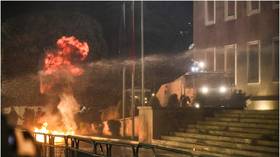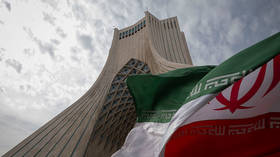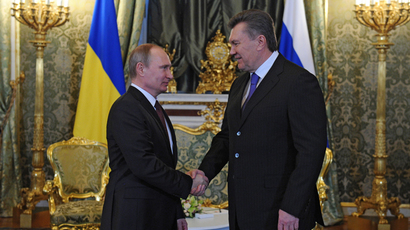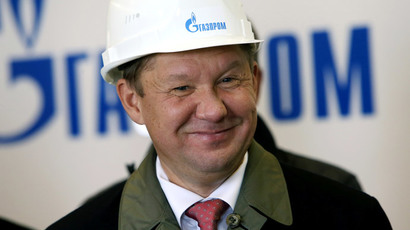Legality of reverse gas deliveries from Europe to Ukraine under doubt – Gazprom CEO
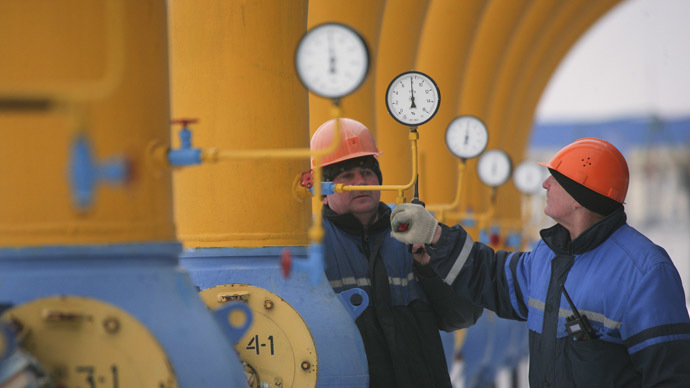
The idea of reverse gas flow from Europe to Ukraine raises lots of questions, says Gazprom CEO Aleksey Miller, as the physical reverse flow is hardly possible and a virtual one questions the legality of the reverse flow itself.
“We very much doubt whether reverse flow from Slovakia to, say, Donetsk, Kharkov or Kiev is physically possible,” Gazprom CEO Aleksey Miller said in an interview with Russian NTV channel.
According to Miller, the pipe “can’t have gas flowing in both directions at the same time,” that’s why it cannot be a physical reverse flow but a virtual one on paper, “which questions those who gave Ukraine the right to control Gazprom gas in the Ukrainian pipe.”
“Our terminals are in Europe. We will certainly look very carefully into that to see if this scheme is legal. I think this issue requires careful study and consideration. For example, I think that the European companies that plan to supply gas to Ukraine through such reverse flow should think twice whether such transactions are legal,” said Miller.
The issue of the reverse gas deliveries was raised by Ukraine’s coup-appointed PM Arseniy Yatsenyuk who said on Wednesday that Ukraine is looking forward to a political decision by the EU to start reverse gas supplies from Slovakia. Yatsenyuk also added on Saturday that Ukraine may get up to 20 billion cubic meters of reverse gas from Slovakia, Poland and Hungary.
Ukraine owes Russia $11.4 billion after Black Sea Fleet deal denounced
Miller pointed to a huge debt which Ukraine owes Russia due to the fact that Moscow was paying in advance for the stationing of the Black Sea fleet in Sevastopol after 2017.
“Ukraine has been underpaying the Russian Federation $100 per 1,000 cubic meters. Since the signing of the Kharkov Accords, this discount amounted to $11.4 billion,” he says.
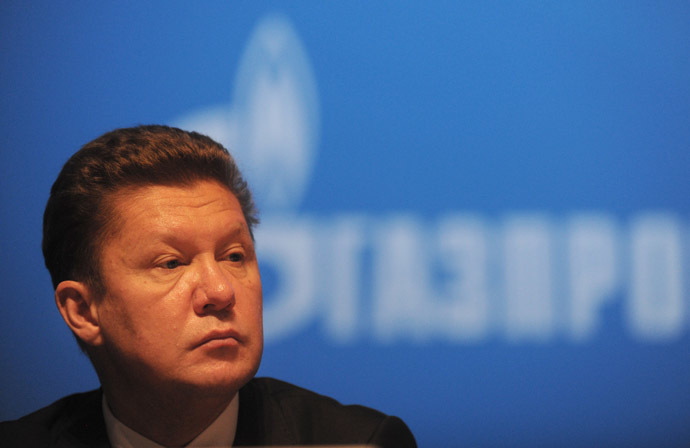
Under the Kharkov agreement signed on April 30, 2010 Russia guaranteed Ukraine a $100 per 1,000 cubic meters gas discount in return for using the Sevastopol port to host its naval fleet.
“That’s the amount that was not paid to the Russian government,” says Miller, “That’s the money that Russia has not received. That’s pensions, salaries for public employees, social benefits, etc. This is a huge amount of money.”
According to Miller, as there are no Kharkov accords anymore, “the contract is void.”
“Russia has been paying for the lease of the Black Sea Fleet’s naval base in Ukraine, in Sevastopol, after May 2017. In other words, Russia had been making a prepayment. Thus, Ukraine now owes Russia $11.4 billion. And the Russian government suggests that we think about ways to settle this debt,” he adds.
Rise of gas price from $268.5 to $485 ‘was not a surprise for Ukraine’
The Ukrainian authorities had two discounts for buying Russian gas. The first one followed the deal between Russia and Ukraine in December, when Moscow offered Ukraine’s Yanukovich-led government a $15 billion loan and a 33 percent discount on natural gas, a lifeline to help its faltering economy. The natural gas discount was subject to review each financial quarter.
On April 1, when the quarter ended, Gazprom said it cancelled this discount and announced that the price for gas exports to Ukraine returns to $385.50 per 1,000 cubic meters. According to Miller, it followed Ukraine’s default on its obligation to repay its debt for gas supplies in 2013 and the 100 percent lack of payment for supplies in March.
The second $100 discount was under Kharkov agreement. On April 2, Russia cancelled it after the Kharkov agreement was denounced, so Ukraine will have to pay $485 per thousand cubic meters starting April.
“The Ukrainian budget was based on the understanding that gas costs $485 [per 1 thousand cubic meters],” says Miller. “This proves that Ukraine recognizes this as a market price, recognized the current contract and is willing to pay this price for our gas,” he says.
“Indeed, some time ago we offer Ukraine a substantial down payment for the transit of our gas to Europe. In fact, this has been helping Ukraine pay for the deliveries of Russian gas,” added Miller.
According to Miller, if Ukraine doesn’t fulfill the agreement, then there won’t be any discounts on gas, said Miller. And Ukraine hasn’t fulfilled its duties.
Meanwhile, Gazprom CEO says that Ukraine has no objections about the rise in the gas price as it knew about the conditions of the gas deal.
The new govt in Kiev are exactly those people who signed gas contracts with Russia
“What’s most striking is that the current government in Kiev consists of the people who took part in the drafting and signing of the contracts that are in place today. I mean Yury Prodan, the Minister of Energy of Ukraine Yury Prodan,” says Miller. “He was part of the delegation headed by Yulia Timoshenko and took part in the negotiations.”
According to Gazprom CEO, “these contracts were signed in Prodan’s presence.”
“Prodan knows very well all the terms and conditions of these contracts; he also knows perfectly well the pricing mechanisms,” says Miller.
Miller said they had a talk with Prodan just a couple of days ago as they discussed the gas supply partnership.
“I would like to emphasize that Prodan personally took part in those contract negotiations which took place in Moscow; he took part in the final stage of the negotiations and the signing procedure of the gas supply contracts,” says he.
However, it seems that Ukraine’s Energy Minister has forgotten about the gas talks as on Saturday he said that Ukraine will ask the Arbitration Institute of the Stockholm Chamber of Commerce to review the price of Russian gas.
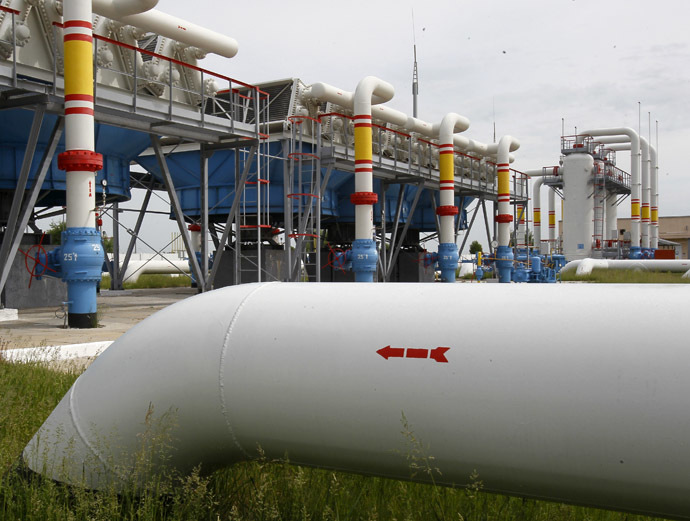
Meanwhile, it is not only Energy Minister who was aware of the details of the gas deal with Russia. Current PM Arseny Yatsenyuk also knew about the possibility of raising the prices.
“It is also worth mentioning that the current prime minister of Ukraine Arseny Yatsenyuk was at the time a Verkhovna Rada deputy and also was very well acquainted with the government’s actions and activities steered by Yulia Timoshenko,” says Miller.
Another deal - another debt
Ukraine, which imports about half its natural gas from Gazprom, owes the company $1.7 billion for gas that has already been delivered in 2013 and 2014.
“In 2013 Russia gave Ukraine $3 bln, they returned only $1, 3 at a slow pace,” said Miller, adding that Russia “hasn’t received a dollar from Ukraine in March!”
Gas contracts ‘were designed long-termed’
Gas contracts with Ukraine were signed in January 2009 and were designed “to ensure supplies for the long term, for ten years to be precise,” according to Gazprom CEO.
“The first one sets conditions for supplies to Ukraine and the other for gas transit to Europe through Ukraine. The key parameters of these contracts rely on market principles,” he adds.
According to the first contract, the total annual volume is 55 billion cubic meters of gas.
“That is Ukraine can buy up to 55 billion cubic meters of gas and Gazprom shall have the necessary capacity to meet this demand,” he says.
According to Miller, Ukrainian side “never challenged the validity of the current agreements.”
“January 2014 marked 5 years since the contracts were signed, we got the payment and the Ukrainian side never challenged the validity of the current contracts,” says Miller, “Furthermore, in 2010, as part of the cooperation agreement signed between Russia and Ukraine in Kharkov, the Russian government cancelled the exports customs fee and a supplement was signed to incorporate that change.”
However, Gazprom CEO explained that the company cannot deliver gas directly to the customers in Ukraine.
“As for Ukraine’s market, we do not have the opportunity to deal in end customer deliveries there. We only have on wholesale buyer, the Naftogaz. It is the sole buyer of all of our gas.”
Why Germany has more discounts on gas
Meanwhile Miller noted that despite difficulties with Ukrainian market, Gazprom may deal with the end consumers of gas in the EU, particularly in Germany.
According to Miller, Gazprom sells “very significant volumes of gas directly to the end consumers in the German market.”
“That is why it would be incorrect to compare the gas prices set by Russia in Germany with the prices in Ukraine,” he says.
He also noted the contribution which Germany provides for Russian Gas Company.
“Another factor that should be taken into account here is that our German partners have made significant investments into Russia’s gas industry and are our partners to many production projects in Russia,” he added.






